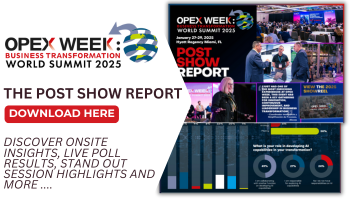Process mining is transforming BPM
Process mining has transformed BPM & Emirates drives digital transformation with eQuote
Add bookmarkListen to this content
Audio conversion provided by OpenAI

PEX Network’s weekly news bulletin rounds up the latest research, reports and publications in operational excellence (OPEX), digital transformation, artificial intelligence (AI) and automation, business process management (BPM), process mining and process intelligence and more.
This week includes:
- Process mining is transforming BPM
- Navigating AI regulation and legislation: A CIO’s guide
- Emirates SkyCargo launches eQuote to drive digital transformation
Don't miss any news, updates or insider tips from PEX Network by getting them delivered to your inbox. Sign up to our newsletter and join our community of experts.
Process mining is transforming BPM
Traditional Business Process Management (BPM) methods often fall short in capturing real-world operations. A new study by Infomatics Corp shows how process mining, a data-driven technique, is transforming BPM by enhancing transparency, efficiency and agility.
Conventional BPM relies on subjective input and static models. Process mining extracts event logs from enterprise systems, revealing actual workflows and addressing BPM’s blind spots.
Process mining uses data from ERP, CRM and workflow systems to model processes accurately. This enables businesses to uncover bottlenecks, ensure compliance and drive continuous improvement.
“Process mining shifts BPM from guesswork to science,” says Kokala.
In financial services, process mining cut loan approval delays and improved compliance. Logistics firms reduced errors and optimized workflows through non-conformance detection.
The study outlines a BPM-process mining framework that covers:
- Data Management – Clean extraction of event logs
- Lifecycle Integration – Applying insights across BPM stages
- Performance Insights – Embedding metrics for ongoing improvement
- By adding predictive analytics, businesses can forecast and prevent process breakdowns
Process mining is driving BPM innovation, boosting efficiency and sharpening competitive edge. This shift to data-driven BPM empowers companies to thrive in a dynamic market.
Navigating AI regulation and legislation: A CIO’s guide
AI misuse can lead to significant legal and financial consequences. High-profile cases, like Lionsgate’s citation issues and Microsoft’s defamation lawsuit, highlight the risks of generative AI (GenAI). With AI adoption surging, organizations must implement governance, risk and compliance (GRC) measures, especially as regulations evolve across jurisdictions.
CIOs face a “patchwork” of regulations governing AI, from data privacy to transparency and discrimination. While upcoming AI-specific laws attract attention, existing regulations already apply to AI usage. Examples include Brazil’s restriction on Meta’s data collection and GDPR enforcement.
The UK anticipates AI legislation, but its direction remains unclear. The AI Safety Institute may join the ICO, Ofcom, FCA and CMA as an additional regulator. Businesses can expect new AI assurance tools and frameworks like ISO/IEC 42001. Highly targeted regulations will apply to leading AI developers and the Online Safety Act extends to GenAI services.
The ICO requires data transparency from major AI providers like Google and OpenAI. Existing laws, including GDPR, regulate AI by covering personal data usage. Businesses must ensure compliance with data protection laws to mitigate risks.
The US lacks comprehensive AI laws but enforces existing regulations under frameworks and executive orders. State-level AI laws add complexity. The EU leads with the comprehensive EU AI Act, which mandates safety, transparency and risk mitigation. The Act includes penalties up to 3 percent of global turnover and applies broadly to AI providers and deployers.
CIOs must prioritize AI literacy and compliance training by February 2025. This includes:
- Understanding data protection regulations
- Mitigating discrimination and consumer rights risks
- Addressing safety concerns with AI-generated content
Emirates SkyCargo launches eQuote to drive digital transformation
Emirates SkyCargo has taken another step in its digital transformation journey with the launch of eQuote, a self-service digital tool that empowers customers with real-time data for seamless cargo bookings. This milestone marks the airline’s commitment to enhancing customer experience, streamlining operations, boosting efficiency and achieving process excellence.
Accessible via e-SkyCargo, eQuote allows customers to request and manage spot quotations 24/7. The tool will gradually roll out worldwide, covering a wide range of products, including sensitive shipments like life sciences and high-value items. eQuote offers greater control and flexibility, reinforcing Emirates SkyCargo’s reputation for top-tier service.
Matthew Scott, VP of Pricing and Interline at Emirates SkyCargo, highlighted the strategic importance of eQuote: “Accelerating digital transformation ensures we stay ahead in evolving supply chains. Real-time data and intuitive tools like eQuote enrich our customer journey and drive efficiency.”
Emirates SkyCargo’s digitization strategy focuses on delivering tangible results for customers and internal teams. Over 60 percent of bookings are now digital, with general cargo, perishables and pharmaceuticals leading the shift. The airline’s presence on major digital marketplaces—WebCargo, cargo.one, CargoAi and CargoWise—further enhances customer access to real-time booking and capacity insights.
By expanding digital bookings to specialty products and increasing weight limits, Emirates SkyCargo has boosted productivity and streamlined workflows. Direct host-to-host connections with key customers like Kuehne+Nagel and DB Schenker ensure integrated, efficient operations.
e-SkyCargo and SkyCargo.com have been revamped to offer more intuitive, user-friendly experiences. The redesigned platforms provide comprehensive product information, packaging guidelines and compliance details, ensuring customers can make informed decisions.
READ MORE PEX RESEARCH & REPORTS NEWS
The 26th Annual OPEX Week: Business Transformation World Summit | post show report

Over 550 transformation leaders from 200 companies across 17 countries gathered to share innovations and stories at OPEX Week 2025. The three unforgettable days sparked groundbreaking ideas and invaluable connections. Don't worry—we've got you covered with a full recap of the 2025 OPEX Week. Download the post-show report here.
To view this content, please fill out the form to register and become a member.
Or, if you're already a member, sign in below to view.
Please note: That all fields marked with an asterisk (*) are required.













